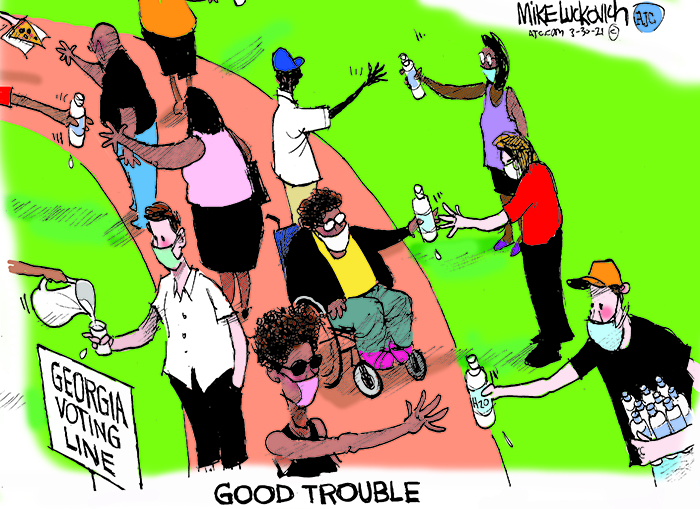The movement for a new America is standing up to defend democracy. Most of us are under no illusions. We see that the assault on voting rights is at the moment the leading edge of a drive toward dictatorship.
Georgia’s new voter suppression law gives the state legislature power to overrule local elections boards, reduces 33 ballot drop boxes down to nine, institutes new ID requirements for voting, and even makes it a crime to give food and water to people standing in line to vote (in hot sun), among many other outrageous provisions. More than 250 voter suppression bills are being considered in 45 states. Florida, Arizona, Georgia, Wisconsin and Pennsylvania all have U.S. Senate races in 2022, and all have passed or are considering voter suppression bills. Georgia was the first to pass a comprehensive bill, in late March.
As Georgia Gov. Brian Kemp signed the bill, Rep. Park Cannon, a Black female lawmaker, was arrested and dragged away for the “crime” of knocking on the governor’s door while trying to enter to witness the bill signing. Historian Heather Cox Richardson noted that Gov. Kemp signed his state’s voter suppression bill surrounded by six white men while seated under a painting of the Callaway Plantation on which more than 100 Black people had been enslaved. “It was a scene that conjured up a lot of history,” wrote Richardson.
Attacks on democracy in the United States have from the beginning of the country relied on denying or suppressing the Black vote, and of course this tactic has deep roots in the South. We should make no mistake: This is not only a vicious attack on the Black vote and the Democratic vote, but an attack on democracy itself. In an era of growing poverty and economic instability, the powerful want only the privileged to vote.
Meanwhile the For the People Act and the John R. Lewis Voting Rights Act, two federal bills that would protect the right to vote, are facing resistance in the U.S. Senate.
If the attack on voting rights succeeds, the gains we the people made in the 2018 and 2020 elections could be rolled back, and any future progress would be much more difficult.
The vote was the weapon the people used in the last three years to elect new people to office such as Warnock and Ossoff from Georgia, and many others, and to force the government to pass more stimulus legislation that included things like the $1,400 stimulus checks, extended unemployment benefits, assistance for children in poverty, money for states and cities, etc.
Michael Waldman, president of the Brennan Center for Justice, called the wave of voter suppression efforts “the most significant attempted cutback of voting rights since the Jim Crow era.”
Waldman testified in a U.S. Senate hearing in favor of the For the People Act, a national voting rights bill. Waldman said the bill “would be the most significant democracy reform measure in over half a century.” Among other things, it would make automatic voter registration the law of the land, ensure access to vote by mail and early voting, and restore the voting rights of former prisoners. The bill has passed the House, but is liable to die or be emasculated in the Senate unless the filibuster is eliminated and all the Democratic senators are forced into line.
The John R. Lewis Voting Rights Act also faces an uncertain fate in the Senate. It would restore the Voting Rights Act of 1965 (which was eroded by a 2013 Supreme Court decision) and strengthen the provisions in it to protect the freedom to vote for all Americans, particularly voters of color.
People have fought and died for the right to vote. The vote is a crucial weapon, and if we are to build on the gains we’ve made, the vote must be defended. As Helen Butler of the Georgia Coalition for the People’s Agenda put it, “we don’t have a democracy without the right to vote for all people.” Another Georgia activist put it this way: “They can make it as hard as they want to vote, but we are still going to come out.”
Abolish the filibuster — completely!


